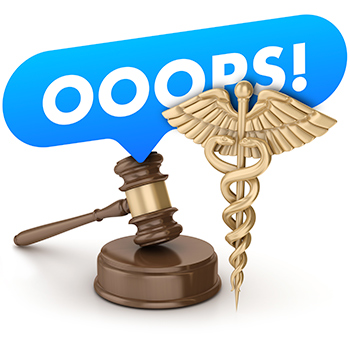
There can be several reasons for medical misdiagnosis. You may have omitted a vital part of your symptoms or medical history, or the doctor may not have listened to you or made a mistake. Regardless of the reason, you or your loved one getting better is the top priority. Not getting the needed answers promptly can have life-threatening results.
Focus on getting the medical attention you or your loved one needs and then connect with an experienced medical misdiagnosis lawyer to see if you have a valid misdiagnosis claim.
What Is Misdiagnosis?
Medical misdiagnosis can happen when medical professionals fail to properly assess a patient or misread test results. Results of a misdiagnosis may include:
- Making a medical condition worse
- Delaying a correct diagnosis
- More harm or death
All of these violate the “medical standard of care” you are legally entitled to when working with healthcare providers.
Misdiagnosis can also mean a condition goes untreated for an extended period of time, or the patient suffers through unnecessary medical treatments. Illnesses that are commonly misdiagnosed include:
- Asthma is often misdiagnosed as recurring bronchitis.
- A heart attack is often misdiagnosed as a panic attack or indigestion.
- Lyme disease is often misdiagnosed as mononucleosis, depression, or the flu.
- Parkinson’s is often misdiagnosed as stress, Alzheimer’s, or stroke.
- Lupus is often misdiagnosed as rheumatoid arthritis, fibromyalgia, or chronic fatigue syndrome.
To file a misdiagnosis claim, the misdiagnosis needs to have caused an injury or death.
What Do I Do If I Am Worse After Seeing a Doctor?
During a misdiagnosis claim, the patient will likely be reviewed just as much as the doctor. The court will want to ensure you aren’t committing fraud by purposely making your injury or illness worse. Getting better is your first priority. If you need different or additional care, you need to get it immediately.
As a patient, you have a responsibility to mitigate damages by doing the following:
- Following the medical professional’s orders unless you see no improvement or they’re making you worse
- Not waiting to seek additional care
How Do I Start the Misdiagnosis Claim Process?
Regardless of whether you are planning to use an attorney, you should reach out to a reputable law firm with experienced medical misdiagnosis lawyers for a consultation. Most offer free case evaluations where they can analyze your case and explain your legal rights, what options are available, and if you have a case. It’s important to remember you don’t have attorney-client privileges until you formally hire an attorney.
How Do You Prove Misdiagnosis?
To sue for medical malpractice, you have to establish four basic elements of duty, breach, causation and damages.
Duty
Did the medical professional have a duty of care for you or your loved one? Typically, when there’s an established doctor-patient relationship, the medical professional must act as a reasonably competent provider.
Breach
Did the medical professional breach their duty? Just because misdiagnosis of an illness or injury occurred, it doesn’t necessarily mean they were negligent. To establish a breach of duty, you need to be able to prove another reasonably competent medical professional would have correctly diagnosed the injury or illness.
Causation
Did the misdiagnosis cause harm to your or your loved one? For instance, if a doctor gives a misdiagnosis of the flu instead of cancer to your loved one and the next day they are killed in a car accident, the misdiagnosis wasn’t the cause of death.
Damages
Were there damages associated with the misdiagnosis? A doctor may have given a misdiagnosis of the flu instead of migraines and prescribed Tylenol, which helped cure the migraines. This means there weren’t any damages suffered by you as a result of the misdiagnosis.
Once these basic elements are established, you need to gather paperwork showing any medical or diagnostic errors that occurred while at the doctor’s appointments or hospital. This information will help:
- Give your lawyer a framework for building your misdiagnosis claim.
- Prove you had a patient-doctor relationship.
- Show evidence of the medical professional’s negligence.
- Support your misdiagnosis claim in the future.
Medical professionals should provide you with the records you are requesting. If you feel they are resisting, you need to inform your attorney so they can assist.
Medical misdiagnosis lawyers may also have you seek a second option of the medical care you already received to assist in proving the medical professional you were working with was wrong. This is known as differential diagnosis and is utilized to show a misdiagnosis initially happened. Other medical professionals can also be used as expert witnesses if your misdiagnosis claim goes to trial.
The legal team at Janet, Janet & Suggs understands the damage a medical misdiagnosis can cause to you and your family. Complete our contact form to let our team of medical misdiagnosis lawyers evaluate your case and schedule a free, no-obligation consultation for you today.

Reviewed by:
Trish Fletcher, MS, BSN, CRNP, NNP-BC, ALNC
Neonatal Nurse Practitioner | Birth Injury Legal Nurse Consultant
Tricia is a dedicated, focused, Birth Injury Legal Nurse Consultant and Neonatal Nurse Practitioner with more than 25 years of experience. Her strong clinical and critical thinking skills, paired with expertise caring for neonates in a Level III Neonatal Intensive Care Unit (NICU), ensures meticulous medical records review. READ FULL BIO
